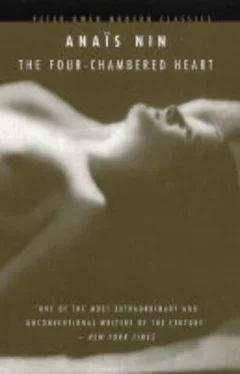Anaïs Nin - The Four-Chambered Heart
Здесь есть возможность читать онлайн «Anaïs Nin - The Four-Chambered Heart» весь текст электронной книги совершенно бесплатно (целиком полную версию без сокращений). В некоторых случаях можно слушать аудио, скачать через торрент в формате fb2 и присутствует краткое содержание. Год выпуска: 2004, ISBN: 2004, Издательство: Peter Owen Limited, Жанр: Классическая проза, Эротические любовные романы, на английском языке. Описание произведения, (предисловие) а так же отзывы посетителей доступны на портале библиотеки ЛибКат.
- Название:The Four-Chambered Heart
- Автор:
- Издательство:Peter Owen Limited
- Жанр:
- Год:2004
- ISBN:9780720611557
- Рейтинг книги:3 / 5. Голосов: 1
-
Избранное:Добавить в избранное
- Отзывы:
-
Ваша оценка:
- 60
- 1
- 2
- 3
- 4
- 5
The Four-Chambered Heart: краткое содержание, описание и аннотация
Предлагаем к чтению аннотацию, описание, краткое содержание или предисловие (зависит от того, что написал сам автор книги «The Four-Chambered Heart»). Если вы не нашли необходимую информацию о книге — напишите в комментариях, мы постараемся отыскать её.
The Four-Chambered Heart — читать онлайн бесплатно полную книгу (весь текст) целиком
Ниже представлен текст книги, разбитый по страницам. Система сохранения места последней прочитанной страницы, позволяет с удобством читать онлайн бесплатно книгу «The Four-Chambered Heart», без необходимости каждый раз заново искать на чём Вы остановились. Поставьте закладку, и сможете в любой момент перейти на страницу, на которой закончили чтение.
Интервал:
Закладка:
To break the hypnosis came certain shocks, which Djuna was losing her power to interpret.
When she had gradually passed to Zora most of her belongings, all of her jewelry—to such an extreme that she had to surrender going to certain places and seeing certain friends where she could not appear dressed as carelessly as she was—she arrived unexpectedly at Zora’s and found her sitting among six opened trunks.
“I’m working on a costume for a new dance,” said Zora. The trunks overflowed with clothes. Not theatre costumes only, but coats, dresses, stockings, underwear, shoes.
Djuna looked bewildered and Zora began to show her all that the trunks contained, explaining: “I bought all this when things were going well for me in New York.”
“But you could wear them now!”
“Yes, I could, but they look too nice. I just like to keep them and look at them now and then.”
And all the time she had been wearing torn shoes, mended stockings, dresses too light for winter, when not wearing all that she had extracted from Djuna.
This discovery stunned Djuna. It proved what she had felt all the time obscurely, that Zora’s dramatization of the poor, the cold, the scantily dressed, the pathetic woman, was a voluntary role which suited her deepest convenience. That this drabness, which constantly aroused Rango’s pity, was deliberate, that, at any moment, she could have been better dressed than Djuna.
That night Djuna could not refrain from asking Rango: “Did you know when I gave up my fur coat for Zora to wear this winter that she had one in her trunk all the time?”
“Yes,” said Rango. “Zora has a lot of the gypsy you could say. Gypsies always keep their finery for certain occasions, and like to look at it now and then, but seldom wear it.”
“Am I going mad?” asked Djuna of herself. “Or is Rango as mad as Zora? He is not aware of the absurdity, the cruelty of this. He thinks it’s natural that I should dispossess myself for a woman obsessed with the desire to arouse pity.”
But as this incident threatened her faith in Rango, she soon closed her eyes again.
The actor does not suffer any cramps because he knows the role he plays he will be able to discard at some stated time, and walk free again to be himself.
But Djuna’s role in life seemed inescapable. She was doomed to be devoted to a cause she did not believe in. Zora would never get well; Rango would never be free. She suffered from pains which were like cramps, because in all these unnatural positions she took, these contortions of giving, of surrender, there was a strain from the knowledge that she could never, as long as she loved Rango, ever be free and herself again.
Out of physical exhaustion she would occasionally run away.
This time to conceal her exhaustion from Rango she took the Dover-Calais boat intending to hide in London for a few days at the house of a friend.
Sitting on deck, on a foggy afternoon, she felt so utterly tired and discouraged that she fell asleep. Tired tired tired, her body sank into deep sleep on the deck chair. Sleep. A deep deep sleep…until she felt a hand on her shoulder as if calling. She would not open her eyes; she would not respond. She dreaded to awaken. She feigned a complete sleep and turned her head away from the hand that was beckoning…
But the voice persisted: “Mademoiselle, mademoiselle…” A voice pleading.
She felt the spray on her face, the swaying of the ship, and began to hear the voices around her.
She opened her eyes.
A man was leaning over her, his hand still on her shoulder. “Mademoiselle, forgive me. I know I should have let you sleep. Forgive me.”
“Why did you wake me? I was so tired, so tired.” She was not fully awake yet, not awake enough to be angry, or even reproachful.
“Forgive me. I can explain, if you will let me. I am not trying to flirt, believe me. I’m a grand blesse de guerre. I can’t tell you how seriously wounded, but it’s left me so I can’t bear fog, damp, rain, or the sea. Pains. Such pains all over the body. I have to make this trip often, for my work. It’s torture, you know. Going back to England now… When the pains start there is nothing I can do but to talk to someone. I had to talk to someone. I looked all around me. I looked into every face. I saw you asleep. I know it was inconsiderate, but I felt: that’s the woman I can talk to. It will help me—do you mind?”
“I don’t mind,” said Djuna.
And they talked, all the way, on the train too, all the way to London. When she reached London she was near collapse. She took the first hotel room she could find and slept for twelve hours. Then she returned to Paris.
No more questioning, no more interpretations, no more examinations of her life. She was resigned to her destiny. It was her destiny. The grand blesse de guerre on the ship had made her feel it, had convinced her.
So she made a pirouette charged with sadness, on the revolving stages of awareness, and returned to this role she had been fashioned for, even down to the face, even when asleep.
But when people play a role motivated by false impulses, moved by compulsions formed by fear, by distortions, rather than by a deep need, the only symptom which reveals that it is a role and that acts do not correspond to the true nature, is the sense of unbearable tension.
The ways to measure one’s insincerities are few, but Djuna knew that the most infallible one was joylessness. Any task accomplished without joy was a falsity to one’s true nature. When Djuna indulged in an extravagant giving to Zora she felt no joy because it was misinterpreted by both Rango and Zora. If there was a natural goodness in Djuna it was not this magnified, this self-destructive annihilation of all of herself.
But this role could last a lifetime, since Rango denied the possibility of change by clairvoyance, the possibility of a lucid change of direction. They were rudderless and at the mercy of Zora’s madness.
She did not even gain the prestige granted to the professional actor, for there is this about roles played in life, and that is that no one is deceived. The most obtuse, the most insensitive people feel a dissonance, sense an imposture, and, whereas the actor is respected for creating an illusion on the stage, no one is respected for seeking to create an illusion in life.
She planned another escape, this time with Rango and Zora. She felt that taking them to the sea, into nature, might heal them all, might strengthen Zora and bring them peace.
It was a most arduous undertaking to get Zora to pack and to free Rango from all his tangles. They missed not one but several trains. Zora had two trunks of belongings. Rango had debts and his debtors were reluctant to let him leave Paris. They overslept in the mornings.
Rango borrowed some money and bought Djuna a present, a slender white leather belt from Morocco. It was his first present and Djuna was overjoyed and wore it proudly. But when the three met at the station she found Zora wearing an identical belt, so her own lost its charm for her and she threw it away.
The fishing port they reached in the morning lay in the sun. The crescent-shaped harbor sheltered yachts and fishing boats from all over the world. The cafes were all gathered on the edge and as they sat having coffee they saw the boats come to life, the sailors and voyagers emerging from theircabins. They saw the small portholes open, the hatches lifted, and sails spread. They saw the sailors starting to polish brass and wash decks.
Behind them rose the hills planted with white houses built during the Moors’ invasion of the Mediterranean coast.
The place was animated, like a perpetual carnival. The fluttering, glitter, and mobility of the harbor and ships were reflected in the cafes and visitors. Women’s scarves answered the coquetries of the sails. The eyes, skins, and smiles were as polished as the brass. Women’s sea-shell necklaces reflected the sky and the sea.
Читать дальшеИнтервал:
Закладка:
Похожие книги на «The Four-Chambered Heart»
Представляем Вашему вниманию похожие книги на «The Four-Chambered Heart» списком для выбора. Мы отобрали схожую по названию и смыслу литературу в надежде предоставить читателям больше вариантов отыскать новые, интересные, ещё непрочитанные произведения.
Обсуждение, отзывы о книге «The Four-Chambered Heart» и просто собственные мнения читателей. Оставьте ваши комментарии, напишите, что Вы думаете о произведении, его смысле или главных героях. Укажите что конкретно понравилось, а что нет, и почему Вы так считаете.












